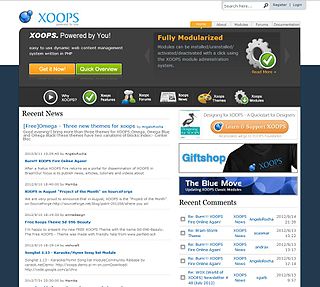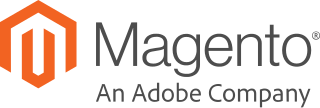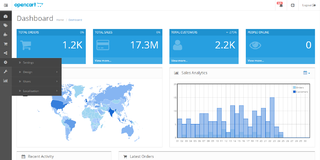
Drupal is a free and open-source web content management system (CMS) written in PHP and distributed under the GNU General Public License. Drupal provides an open-source back-end framework for at least 14% of the top 10,000 websites worldwide and 1.2% of the top 10 million websites—ranging from personal blogs to corporate, political, and government sites. Systems also use Drupal for knowledge management and for business collaboration.

XOOPS is a free open-source content management system (CMS), written in PHP. It uses a modular architecture allowing users to customize, update and theme their websites. XOOPS is released under the terms of the GNU General Public License (GPL) and is free to use, modify and redistribute.
eZ Publish is an open-source enterprise PHP content management system that was developed by the Norwegian company Ibexa. eZ Publish is now maintained by 7x. eZ Publish is freely available under the GNU GPL version 2 license, as well as under proprietary licenses that include commercial support. In 2015, eZ Systems introduced eZ Platform to replace eZ Publish with a more modern and future-proof solution. In 2024, 7x released eZ Publish 6.0 (stable) to replace eZ Publish 5.4 with a more modern and future-proof solution compatible with PHP 7.x and 8.x software.
OsCommerce is an e-commerce software solution. It can be used on any web server that has PHP and MySQL installed. It is available as free software under the GNU General Public License.

Online shopping is a form of electronic commerce which allows consumers to directly buy goods or services from a seller over the Internet using a web browser or a mobile app. Consumers find a product of interest by visiting the website of the retailer directly or by searching among alternative vendors using a shopping search engine, which displays the same product's availability and pricing at different e-retailers. As of 2020, customers can shop online using a range of different computers and devices, including desktop computers, laptops, tablet computers and smartphones.

Zen Cart is an online store management system. It is PHP-based, using a MySQL database and HTML components. Support is provided for numerous languages and currencies, and it is freely available under the GNU General Public License.
Shopping cart software is a piece of e-commerce software on a web server that allows visitors to have an Internet site to select items for eventual purchase.

MODX is an open source content management system and web application framework for publishing content on the World Wide Web and intranets. MODX is licensed under the GPL, is written in the PHP programming language, and supports MySQL, MariaDB and Percona Server as the database. It was awarded Packt Publishing's Most Promising Open Source Content Management System in 2007.

Magento is an open-source e-commerce platform written in PHP. Magento source code is distributed under Open Software License. Magento was acquired by Adobe Inc in May 2018 for $1.68 billion.

CiviCRM is a web-based suite of internationalized open-source software for constituency relationship management that falls under the broad rubric of customer relationship management. It is specifically designed for the needs of non-profit, non-governmental, and advocacy groups, and serves as an association-management system.
The following is a comparison of the features of notable shopping cart software packages available. Some such shopping cart software is extensible through third-party software components and applications. As such, the features listed below may not encompass all possible features for a given software package. The software listed here is but a fraction of all such packages on the market.
PrestaShop is a freemium, open source e-commerce platform. The software is published under the Open Software License (OSL). It is written in the PHP programming language with support for the MySQL database management system. It has a software dependency on the Symfony PHP framework.

CMS Made Simple (CMSMS) is a free, open source (GPL) content management system (CMS) to provide developers, programmers and site owners a web-based development and administration area. In 2017 it won the CMS Critic annual award for Best Open Source Content Management.

VirtueMart is an open-source e-commerce application designed as an extension of the Mambo or Joomla! content management systems (CMS). VirtueMart is written in PHP and requires the MySQL database environment for storage. It is best suited for low to medium level traffic web-sites.

Dolibarr ERP CRM is an open source, free software package for companies of any size, foundations or freelancers. It includes different features for enterprise resource planning (ERP) and customer relationship management (CRM) but also other features for different activities.
The Open Semantic Framework (OSF) is an integrated software stack using semantic technologies for knowledge management. It has a layered architecture that combines existing open source software with additional open source components developed specifically to provide a complete Web application framework. OSF is made available under the Apache 2 license.

Odoo is a Belgian suite of business management software tools including, for example, CRM, e-commerce, billing, accounting, manufacturing, warehouse, project management, and inventory management.

OpenCart is an online store management system developed by Hong Kong-based OpenCart Limited. It is PHP-based, using a MySQLi or PostgreSQL database and HTML components. Support is provided for different languages and currencies. It is freely available under the GNU General Public License.
nopCommerce is an open-source eCommerce platform based on Microsoft's ASP.NET Core framework and MS SQL Server 2012 backend Database. It provides a catalog frontend and an administration tool backend, allowing shopping cart creation. It is available under the nopCommerce Public License V3 and officially launched in October 2008 for small to medium-sized businesses.











